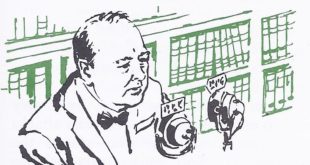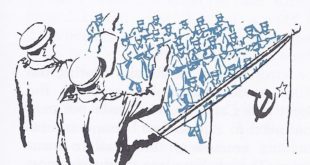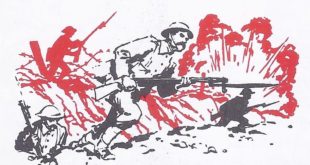It was summer in 1939, vacation time for lots of people. No one knows how many Americans heard the voice of the British statesman Winston Churchill coming over the air on August 8, less than a month before World War 2 began. His words were grim, prophetic and weighted with bitter humour. “Holiday time, ladies and gentlemen! Holiday time, my friends across the Atlantic! Holiday time, when the summer calls the toilers of all countries for an all too brief spell from the offices and mills and stiff routine of daily life and bread-winning and sends them to seek, if not rest, at …
Read More »World Conflicts Threaten to Destroy Civilization
Dictators in Germany and Italy Challenge Democracies
Dictators came to power in many European countries during the twenty years following World War I. About 9:20 P.M. on February 27, 1933, the rumble and clang of fire engines echoed through the heart of Berlin, capital city of Germany. Down the broad avenue called Unter den Linden the trucks roared toward the Reichstag building where the German legislature met, but the firemen were too late; they could not check the flames which licked savagely from the windows. Within a few hours the big building was no more than a smoke-stained skeleton. The Reichstag fire was a grim prophecy of what lay ahead for Germany. …
Read More »Russia Becomes a Communist Dictatorship
When the United States entered World War 1, President Wilson had stated that America’s aim in taking up arms was “to make the world safe for democracy.” The first results of the war seemed to show that this attempt had succeeded. Old empires had crumbled and new republics had risen from their ruins. Democratic constitutions were adopted in most of the countries which the war had created or remodeled, but this apparent victory for democracy did not last, even though kings did not return to power as they had in 1815 after Napoleon’s defeat. What happened was that the kings …
Read More »World War I and the Peace that Failed
The soldier stood on the muddy “fire step” that reached, shelflike, the length of the deep trench. It was too dark to see his tired, mud-smirched face or to judge how old he was. He wore a steel helmet or “tin hat” and the khaki coloured blouse, pants and spiral leggings of the British Expeditionary Force. The barrel of his Enfield rifle rested on the top of a sodden sandbag. Tensely he crouched, his head thrust forward and turned slightly to the right, the better to hear with. His squinting eyes bored into the foggy gray of pre-dawn light. If …
Read More »


